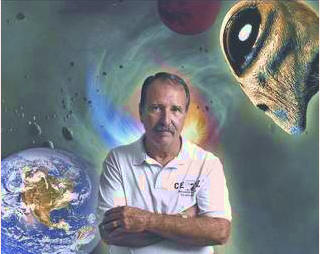Close Encounters of the faith kind
BY CHRIS KRIDLER FLORIDA TODAY
June 27, 2008

Joe Jordan is a longtime UFO investigator whose exploration of claims of alien abduction took him down an unexpected path.
Next weekend, he'll run a conference in Roswell, N.M., site of the purported UFO crash of 1947. But what he has to say won't please many of those attending.
"I am probably the most hated man in UFOlogy," says Jordan, who works for Sea Ray on Merritt Island in environmental health and safety.
What some people see as an alien abduction, Jordan sees as a religious experience, a spiritual war.
Still others, the skeptics, say those who claim such supernatural experiences are interpreting a waking dream, derived from a natural phenomenon called sleep paralysis.
The controversy raises fascinating questions about the way the brain works and the way a mystery unfolds.
This mystery starts in 1977 with eerie lights, a frightening night and William Deffendall of Titusville, who works for an industrial cleaning contractor at Kennedy Space Center.
He was living in Christmas. On a Friday night in late summer or fall -- he can't recall the date -- he saw lights in the woods outside his window. He thought, perhaps, there was a drug raid going on and police were using a helicopter.
When he went to bed and lay next to his sleeping wife, his dogs were restless outside. He got up several times to open the window and shush them, then tried to get back to sleep.
"I remember the dogs barking again, but then I couldn't move . . . and I couldn't see anything," Deffendall says. "It's like everything just turned gray, and my eyes were open. I'm scared to death. I didn't know what was happening . . . and then I felt like a presence around me other than my wife laying there on the bed, and I felt like I was floating up off the bed."
He felt a pain from behind that he assumed came from something pushing him into the air. He tried to scream and couldn't wake up.
"I was in such a panic," he says. "I was so scared. I didn't know what to do."
Though he doesn't remember exactly what he said, he called the name of Jesus, and he woke up.
Deffendall had no idea what had happened to him. But after some time and some research, and meeting Jordan and other people in the Mutual UFO Network or MUFON for whom Jordan does investigations, he came to believe he was abducted by aliens.
Jordan, after hearing so many abduction stories, was fascinated by one aspect of Deffendall's: He was able to stop the experience, whatever it was.
Though it was the first time Jordan had heard of such a case, his off-the-record queries and eventually the experiences of other people -- more than 300, he says -- convinced him that it was the religious declaration that halted the experience, and that the aliens were satanic demons in disguise. Now his CE4 Research Group, named for close encounters of the fourth kind, or abductions, focuses on those experiences.
"I can honestly tell you I came to Christ through UFOs," said Jordan, who got into the UFO culture after he read a book about the Roswell incident.
For years, while with MUFON, he investigated reports of strange lights across the Space Coast and found convincing details, such as flares and Air Force maneuvers, to explain the sightings.
While MUFON has yet to achieve repeatability with its reports on UFOs, he says, he thinks he has achieved it with his subjects' religious testimony. He is bringing "living evidence," victims including Deffendall, to appear with him at the Roswell UFO conference.
Though he says he's heard reports that other "personages" -- figures from other religions -- were invoked to stop purported abduction experiences, he is now committed to a Christian belief system. He calls his talk and a book he's writing "Unholy Communion," a play on Whitley Strieber's famous abduction book, "Communion."
There are two sources for the belief in alien abductions, says Joe Nickell, senior research fellow for the Committee for Skeptical Inquiry, publisher of The Skeptical Inquirer, a magazine that attempts to examine paranormal claims scientifically.
"One of those is that people wake up at night, and they may feel paralyzed or certainly strapped down by aliens, unable to move," he says. "They may see little big-eyed, big-headed humanoids leaning over them. This is a very real experience. They are sure they are not dreaming. They are awake and they see this happening. They feel they're on board a spaceship or something of the sort, and they don't maybe remember much about what happened after that."
This experience is actually sleep paralysis, he says.
"There's a very common experience known popularly as a waking dream. It's almost the opposite of sleepwalking; in sleepwalking your body is awake . . . but your mind is asleep, effectively. Whereas in the waking dream, the opposite is true. Your mind is awake, but your body is asleep. It's still in the sleep mode, and so you're unable to move your body because it's still asleep, and it's a very strange and even alarming sensation."
Over the centuries, the phenomenon of sleep paralysis has been described in a number of myths.
"In the middle ages, you had incubuses and succubuses, types of demons who would press down on you and have their way with you," Nickell says.
A modern religious interpretation of the alien abduction experience harks back to those demons, he suggests.
In the Victorian era, when people woke up with sleep paralysis and felt a presence in the room, "they saw gliding gray ladies' ghosts," he says. And he knew someone who had been reading a lot about vampires who had a vampire experience connected with sleep paralysis.
Another source of belief in alien abductions comes from hypnosis, Nickell says, when people "remember" -- the quote marks are his -- elaborate encounters with aliens.
"Hypnosis is the yellow brick road to fantasyland," he says.
Memories and interpretations of abduction experiences may be helped along by popular images in science fiction. He found that the big-eyed alien image already was visible in popular culture when the famous Betty and Barney Hill abduction case arose in 1961, and that image was repeated again and again.
Anyone can have a sleep paralysis experience, and anyone can believe they were abducted by aliens, but he says that people with rich imaginations are more likely to report such experiences.
"They are sane and normal," Nickell says. "They are also given to fantasies. They are sometimes called fantasizers. These people represent maybe 4 percent of the American public."
In his analysis of the abductees profiled in John Mack's book "Abduction," he found the subjects had many or all of the markers of a "fantasy-prone personality." They told detailed stories under hypnosis unsupported by evidence, Nickell says.
"If they had known how to do it," he adds, "they could write wonderful science fiction."
"I've seen enough proof to know that something is going on," Jordan says. "I can't say what it is. . . . We do know that people are seeing things that are unidentified. They are having experiences that they can't explain. Without a doubt we have that, we have that evidence. We just don't know what it is they're experiencing."
Sometimes, experiencers don't see anything, as was the case with Deffendall's "abduction," though he has seen mysterious lights at other times of his life.
"I don't believe my experience was sleep paralysis," says Deffendall, who emphasizes the importance of Christianity in his life. "I believe mine was real . . . something happened to me."
Jordan, whose Web site also makes an emphatic declaration of Christian faith, is looking forward to presenting Deffendall and other experiencers of this phenomena at his talk in Roswell.
"My whole thing is, please prove me wrong," he says.
The burden of proof is on the claimant, Nickell says.
"They have a lot of evidence, but it's very, very, very poor evidence."
Jordan thinks he has plenty, and he wants to convert the UFO community, and anyone who will listen, to his way of thinking.
He presents a sticker showing an alien head stamped with a slashed circle.
"We are a resistance group, by the way," he says with a smile.
FloridaToday.com

